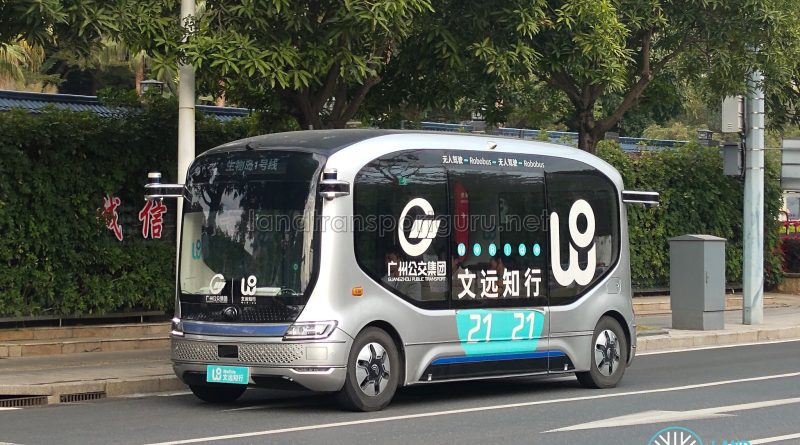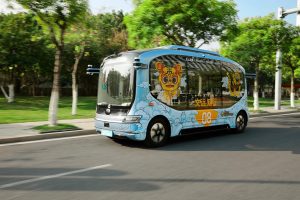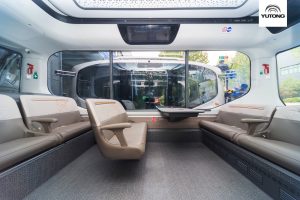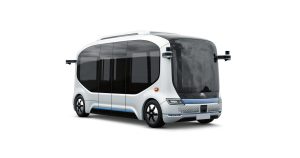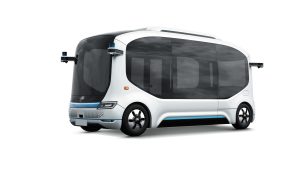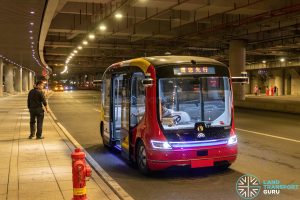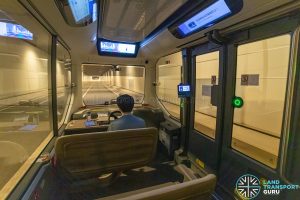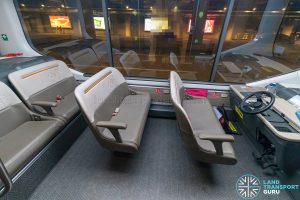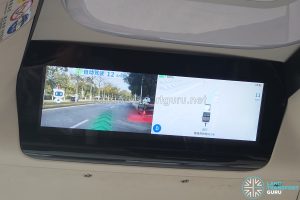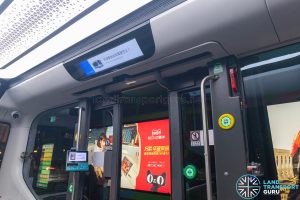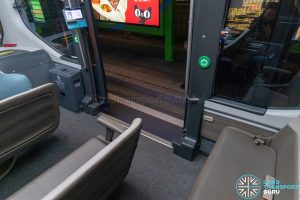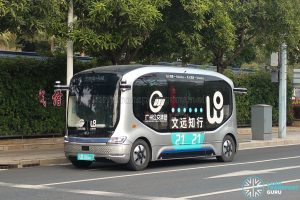| WeRide Robobus | |
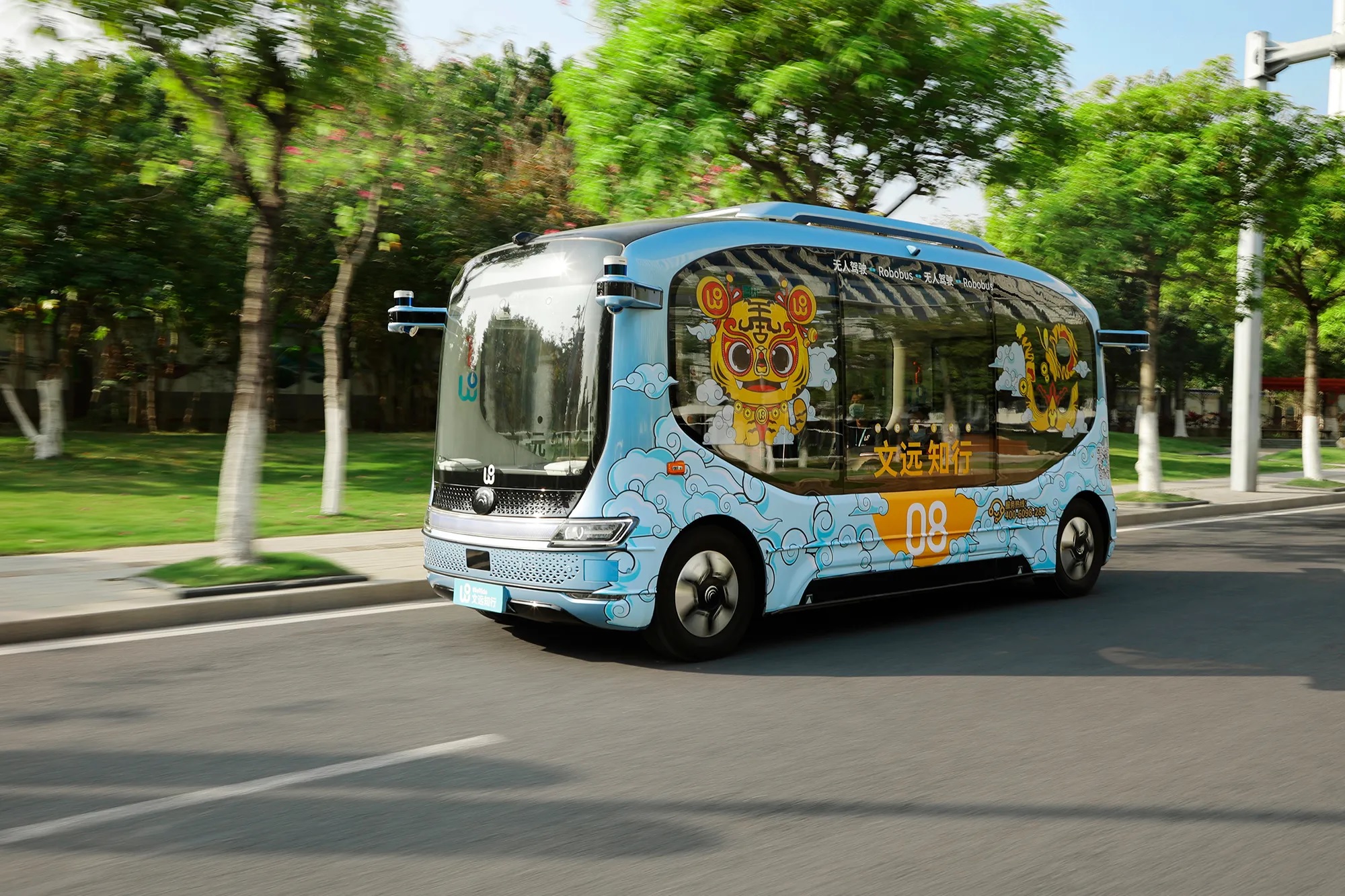 WeRide Robobus in Guangzhou, China |
|
| Manufacturer | Yutong / WeRide |
| Years in operation | 2023 – |
| Operators | WeRide (Singapore) Pte. Ltd. |
| Technical Data | |
| Length | 5.5 m |
| Drivetrain | Electric motor |
| Accessibility | Low Floor |
| Emission Standard | NA (Zero tailpipe emissions) |
The WeRide Robobus, also known as the Yutong Xiaoyu 2.0 (小宇2.0), is an autonomous driving shuttle developed through a collaboration between the Chinese start-up WeRide and the bus manufacturer Yutong. The names “WeRide Robobus” and “Yutong Xiaoyu 2.0” are used interchangeably by different entities involved in its promotion and development.
Under an agreement with Strides Mobility, WeRide will be trialling autonomous vehicles such as its minibus, taxi and road sweeper in Singapore later in 2023.
Background Information:
The WeRide Robobus is touted as the world’s first fully-driverless shuttle capable of SAE Level 4 autonomous driving. This means that the vehicle can reliably manage most driving conditions completely autonomously, and is able to automatically stop safely in the event of adverse conditions (e.g. severe weather) rather than requiring an operator to take over. The vehicle is designed and built by
Road trials of the Robobus were conducted in multiple Chinese cities. In January 2022, the service was launched to the public for the first time in Guangzhou, with two routes serving public roads on Guangzhou Bio-island daily. The vehicle speed is limited to 40 km/h during operation. As of 2023, the RoboBus has been deployed to 18 cities across the globe, mostly in China.
Under an agreement with Strides, WeRide will be trialling autonomous vehicles such as its minibus, taxi and road sweeper in Singapore later in 2023.
Vehicle Background & Onboard Technologies:
In 2019, Yutong introduced the Xiaoyu autonomous minibus, capable of SAE Level 4 autonomous driving. An updated version, Xiaoyu 2.0 (小宇2.0), was subsequently released in 2020. Around the same period in December 2020, Yutong made an investment in and formed a collaboration with the self-driving startup WeRide. This collaboration aimed to further advance the technology, which led to the development of the WeRide Robobus. Functionally, both the Xiaoyu 2.0 and the WeRide Robobus are the same vehicle, derived from the collaboration between Yutong and WeRide.
The bus incorporates LiDAR technology to detect objects in three-dimensional space within a range of 250 meters with no blind spots. High-definition cameras are utilized to identify road markings, traffic signals, pedestrians, and vehicles. In addition, millimetre-wave radar is employed to precisely measure the distance, speed, and directions of surrounding objects, enabling all-weather operation.
Vehicle localisation is achieved through a combination of GNSS (Global Navigation Satellite System), IMU (Inertial Measurement Unit), and LiDAR, resulting in real-time localization with an error margin of less than 10 centimetres. WeRide asserts that the vehicle can effectively operate in adverse weather conditions and navigate through tunnels spanning kilometres, even in the absence of a GPS signal. Beyond onboard sensors, 5G-enabled low-latency V2X communication allows the vehicle to communicate with roadside sensors for enhanced situational awareness.
In 2021, Yutong won the 2021 Red Dot Award for the design of the Xiaoyu 2.0, the first Chinese bus manufacturer to have received this award.
Singapore rollout:
See Also: Autonomous Buses in Singapore
In Singapore, WeRide signed strategic cooperation agreements with two local firms, Woodlands Transport Services and EZ Buzz. The bus arrived at Singapore’s CETRAN autonomous vehicle test circuit on 28 August 2023.
On 11 December 2023, the company announced that it successfully obtained the Milestone Testing Regime Level 1 License for Autonomous Vehicles (AV) on Public Roads (referred to as “M1 License”) and the T1 Assessment License for AVs on Public Paths (referred to as “T1 License”) from the Land Transport Authority (LTA) of Singapore. These licenses allow WeRide to carry out larger-scale tests on Singapore’s public roads in certain approved areas, such as One North and the National University of Singapore.
As of late 2023, the WeRide Robobus was registered RD3228G and tested in public roads around One North.
WeRide Robobus:
| Basic Technical Specifications | |
| Dimensions | 5500 × 2050 × 2650 mm |
| Weight | TBC |
| Traction Motor | TZ210XSYTB70 electric motor (47 kW rated / 120 kW peak) |
| Battery | Lithium Iron Phosphate batteries (173 Ah) |
| Bodywork | Yutong integral bodywork |
| Passenger Capacity | Up to 10 seated passengers (depending on layout) |
| Maximum Operating Speed | 40 km/h during autonomous driving |
| Passenger Features | Wide sliding plug door Ambient lighting Upholstered seats with USB charging ports Passenger emergency stop buttons Passenger Information Displays Low ground clearance (260 mm) for ease of accessibility |
| Autonomous Driving Hardware | LiDAR Millimetre-wave radar HD cameras GNSS sensors 5G-compatible V2X communication |
Gallery (Guangzhou Operations)
External Links & References:
- WeRide launches fully driverless Robobus service to the public | by WeRide.ai | Medium
- Self-driving Vehicles | US EPA
- PM Lee starts week-long China visit | The Straits Times
- WeRide | Singapore’s Prime Minister Lee Hsien Loong took a ride in WeRide’s Robobus as his first stop in China
- Yutong shines at Beijing Bus & Truck Expo 2019_Yutong news_YUTONG
- Autonomous driving-YUTONG
- 【Photo】Yutong Xiaoyu 2.0 autonomous bus won the 2021 Red Dot Award_Autohome
- Fully Driverless|Introducing WeRide Mini Robobus – YouTube
- WeRide 文远知行 – A New Milestone! WeRide Obtained the Singapore M1 and T1 Autonomous Vehicles Licenses
Back to Autonomous Buses in Singapore
Back to Bus Models
